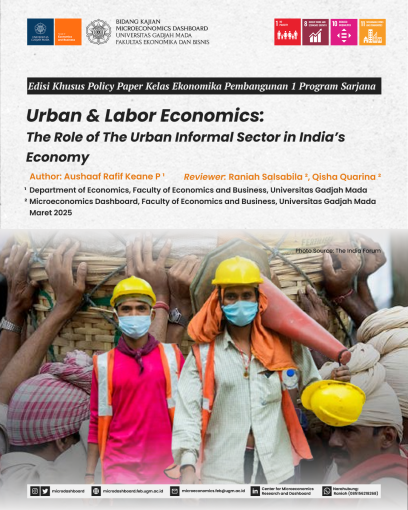
Author: Aushaaf Rafif Keane Pribadi (1)
Reviewer: Raniah Salsabila (2), Qisha Quarina (2)
Maret 2025
Highlights:
- Informal sectors, specifically urban informal sector, play significant roles in the economy and employment of the people in India.
- The dominance of the urban informal sector in India is mainly caused by urbanization coupled with premature deindustrialization.
- The urban informal sector has a significant role in income generation and unemployment reduction, leading to increased livelihood for the poor. On the other side, the urban informal sector faces challenges, such as low access to credit, production technologies, formal training, and public services.
- However, the existence of the urban informal sector still sparks debate on whether it is desired in the economy. The urban informal sector is typically characterized by low productivity, but its vital role as the livelihood of the urban poor and its potential resilience to shocks may benefit India’s current economic condition if treated accordingly.
- It is acknowledged that the development of the urban formal sector can stabilize the urban informal sector through balanced transitions and increased productivity from the spillover effects.
- However, comprehensive policies targeted specifically to the urban informal sector are needed, including facilitation of capacity building, inclusive credit access, accommodative business insurance, and formalization mechanism that is adapted to specific informal sector types.
[embeddoc url=”http://microdashboard.feb.ugm.ac.id/wp-content/uploads/sites/1693/2025/03/Edisi-Khusus-Policy-Paper-Kelas-Ekonomika-Pembangunan-1-Program-Sarjana-UrbanLabor-Economics.pdf”]
